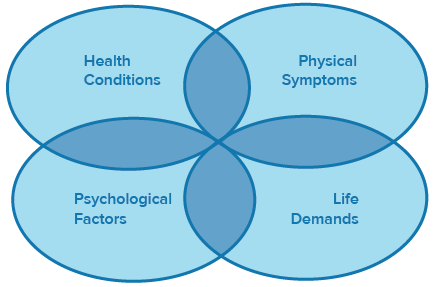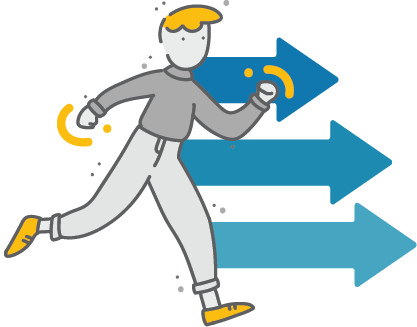Becoming a Self-Manager
Introduction (injured over a month ago)
Updated Aug 8, 2019
Updated Aug 8, 2019
Swipe right to go to the next slide

Even if you have prolonged symptoms (symptoms lasting for over a month), a full recovery of symptoms is likely.
There are interconnections between the physical symptoms (e.g. headaches, poor sleep, and pain), psychological factors (e.g. concentration and memory issues, stress, anxiety, and depression), and life demands (e.g. meeting the demands of work and of parenting).
Because everything is connected, a negative change in one area (e.g. poor sleep) can result in negative changes in other areas (e.g. increased anxiety, more physical symptoms, and reduced ability to meet life demands). On the other hand, a positive change in one area (e.g. better sleep) can create positive changes in others (e.g. less anxiety, fewer physical symptoms, and more energy to meet life demands).
Seeing how everything is connected helps us understand fluctuations in symptoms from day to day, and allows us to focus on those steps we can take in one area to improve how we feel overall.
There are things you can do on an ongoing basis, to help your recovery progress. This is why it is important for you to become a self-manager and take an active role in your own recovery. Afterall, you are with yourself 24/7 and you may only be with your health care provider 1 hour per week (or you may not be working with a health care provider).
You are the best person to start the process of getting active, and you are also the expert on yourself.
Being a self-manger is about empowering yourself with the knowledge, skills, habits, and confidence to set yourself up for a good recovery.
With MyGuide: Concussion, we want to empower you to take action on the things that are most important to you, and can help you along your concussion recovery.
In this spirit, we will be encouraging you to take action throughout MyGuide: Concussion with this “Take Action” illustration.

First, you want to develop awareness of what variables affect your symptoms. For example, making a note that reading triggers your headaches.
Next, you want to learn what activities and habits promote your recovery. For example, understanding why it is helpful to take brain breaks when reading, and then knowing how to gradually increase your reading using the graded activity principles of frequency, duration, and intensity.
You also want to put your knowledge into action. For example, learning how to make your reading goal specific, and creating an Action Plan to reach it.
As a self-manager, you will be solving obstacles that prevent you from taking action. For example, forgetting to take a break may be an obstacle to gradually increasing your reading while also managing your headaches. To solve this obstacle, you could set a timer when reading.
For example, taking brain breaks, and reading in a paced way, will eventually get easier to do and will become a habit. Taking a healthy action only once or twice probably won’t make a difference to your recovery.
As a self-manager, you will stay accountable to using your strategies and habits to enhance your recovery. For example, using a Wellness Checklist to summarize your key Action Plans and to stay accountable to applying your self-management strategies.
You can download a copy of a sample Wellness Checklist [doc] for reference.
Asking for help when you need it is an important role for a self-manager. This includes working in partnership with your family doctor, and asking for support from friends and family.
In the articles under Becoming a Self-Manager, you will learn skills and strategies to become a self-manager.
Below is a summary of self-management skills that are common in concussion recovery. As you review the information, you are encouraged to pick a few areas that are most important to you. Then, focus your energy on those areas.
The topics include:
| Learning how to make an Action Plan |
Learning what is a “Wellness checklist” |
|---|---|
| Problem solving | Exercise |
| Challenging your thoughts | Stress management |
| Pacing | Brain breaks |
| Nutrition | Pain management |
| Assertive communication |
Click the button above to toggle between light mode and dark mode. This toggle can also be found in the menu.
Hold
and tap
to zoom in.
Hold
and tap
to zoom out.
Hold
and tap
to zoom in.
Hold
and tap
to zoom out.
On most mobile devices, you can spread to zoom.
Increase your text size in your device settings.
Remember to take regular breaks while exploring MyGuide: Concussion.
Vancouver Coastal Health’s MyGuide Concussion Team would love to hear your feedback! It matters to us and helps to improve the experience for future users. Your responses will be kept anonymous and your privacy is a top priority. To complete a 15-20 minute online survey or request a telephone survey, please click the link below.